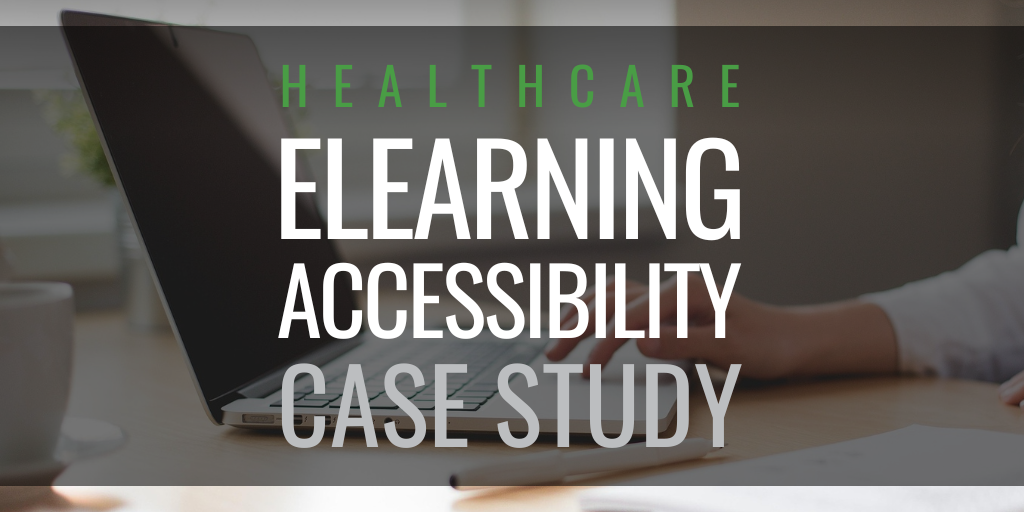Case study: Creating accessible elearning resources for provincial and regional healthcare teams
Challenge
A provincial health authority and one of its regional counterparts wanted to modernize and improve how they create online training. They needed a standardized, efficient and effective way to build elearning courses that worked for all learners, including those with disabilities. They recognized the need to meet WCAG 2.1 AA web accessibility standards, and they wanted to ensure consistency in course materials hosted on a variety of learning management systems.
To accomplish this, they were looking for a vendor to create a set of Articulate Rise and Storyline 360 elearning templates that would support their internal instructional designers. The templates had to reflect their branding, be accessible, and offer scalability options for future content creation. And they had to work well for both experienced and novice instructional designers. Importantly, the templates needed accompanying documentation to provide clear guidance and ensure long-term consistency and compliance.
Solution
Limestone Learning designed a comprehensive package that included:
A series of 20 foundational Storyline 360 template page designs (e.g., course homepage, lesson cover, popups, quizzes, diagrams) featuring:
Interactive elements such as timelines and tabs.
Options for branching scenarios.
Options for course personalization.
A detailed elearning style guide outlining design standards and providing step-by-step instructions, accessibility tips and publishing requirements.
A Rise 360 template and job aid highlighting accessible design practices in Rise.
Each template page included built-in annotations to guide developers in how and when to use the layout, with accessibility and branding considerations noted throughout.
The project kicked off with a two-hour discovery session. Limestone’s project team met with the client leads to review goals, branding, timelines and success criteria. Together, they analyzed the types of learning being developed, the skill levels of internal course developers, and specific accessibility requirements. Using this information — and drawing on Limestone’s experience building accessible learning and supporting instructional designers — they worked collaboratively to decide which page types and design elements would be most useful to include in the templates.
Limestone then:
Created initial drafts of the Storyline template and conducted internal QA.
Walked through the draft template with client stakeholders.
Incorporated feedback over several iterative review cycles, each followed by additional testing and refinement.
Applied two branding styles to the template — one for each of the two participating health authorities.
Developed the style guide alongside the templates, ensuring the documentation supported their functionality and accessibility standards.
Developed the Rise 360 template with branded block examples and detailed information to ensure each block met WCAG 2.1 AA, using a similar iterative approach.
The project wrapped with a debrief meeting to capture lessons learned and ensure client satisfaction.
Results
The result was a set of branded, accessible elearning templates, fully aligned with WCAG 2.1 AA guidelines. Built-in annotations made the templates easy to use, and two branding applications were provided, allowing for use by both the health authority and regional teams. The accompanying style guide gave internal teams the guidance they needed to create new courses independently while maintaining consistency and compliance.
Limestone Learning’s expertise in accessible instructional design was key to the success of this project. By aligning WCAG 2.1 AA standards with practical elearning tools, we helped the client build a strong foundation for inclusive course development. The client received not just a set of templates, but a scalable framework for future elearning development, empowering their L&D teams — and even subject matter experts (SMEs) — to create stronger, accessible elearning courses. Our approach balanced accessibility, branding, and ease of use — resulting in tools that work across teams and platforms. The outcome demonstrates how accessibility and usability can go hand in hand when supported by thoughtful design and clear documentation.
Limestone Learning can work with you to create accessible, branded learning solutions for your healthcare organization — whether regional, provincial or national. Contact us here to start the conversation.
(Header image: "Notebook Work Computer Woman" by Hamonazaryan1 is licensed by Pexels.)






